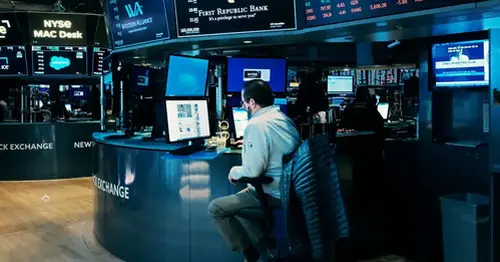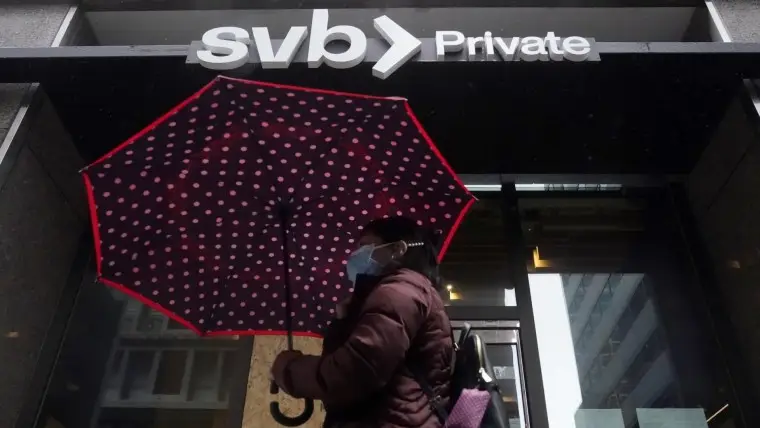
Markets improve on reports of lifelines to First Republic and Credit Suisse
Bank stocks started to bounce back in midday trading on reports that two embattled lenders were receiving fresh financial support, easing some of the worries on Wall Street about a global banking crisis.
Shares of the U.S. lender First Republic were still down about 15% Thursday but notched an improvement from the 35% decline suffered earlier in the day, after Bloomberg reported that the bank was exploring its options, including a potential sale.
The regional bank pared some of those losses after a report in the Wall Street Journal said it was in talks with financial giants including JPMorgan and Citigroup to potentially provide a cash infusion to First Republic — whose stock plummeted after two credit rating agencies downgraded it to junk status earlier this week.
Neither media report, each citing people familiar with the discussions, has been confirmed independently by NBC News.
First Republic is among a handful of midsize and regional bank stocks that have been under pressure since the collapses of Silicon Valley Bank and Signature Bank. First Republic had the third-highest rate of uninsured U.S. deposits after those two failed lenders.
The S&P was up more than 1% Thursday afternoon, and the Dow Jones Industrial Average gained more than 170 points. A fund that bundles regional bank stocks was trading about 1.4% higher.
The upturn followed news earlier in the day that Credit Suisse had agreed to borrow $54 billion from Switzerland's central bank. Credit Suisse — Switzerland’s second-largest commercial lender — saw its stock surge on the announcement, reversing a steep decline Wednesday as part of a broader market selloff.

Testifying before the Senate Finance Committee on Thursday, Treasury Secretary Janet Yellen sought to pacify markets, saying that the financial sector was on stable footing.
“I can reassure the members of the Committee that our banking system remains sound, and that Americans can feel confident that their deposits will be there when they need them,” Yellen said. “This week’s actions demonstrate our resolute commitment to ensure that depositors’ savings remain safe.”
DOJ and SEC launch investigations into Silicon Valley Bank collapse
March 15, 202303:22The volatility on Wall Street came after Credit Suisse led a selloff in bank stocks as its share price hit a record low Wednesday. The lender’s long-standing problems were compounded when its largest investor, the Saudi National Bank, said earlier this week that it would not offer more financial assistance due to regulatory checks that would kick in.
Early Thursday, the Saudi bank’s chairman, Ammar Al Khudairy, said that the market turmoil in shares of the Swiss lender was “unwarranted.”
“If you look at how the entire banking sector has dropped, unfortunately, a lot of people were just looking for excuses,” he told CNBC’s Hadley Gamble. “It’s panic, a little bit of panic — I believe completely unwarranted, whether it be for Credit Suisse or for the entire market.”
Thursday’s Credit Suisse action is the first major international bank to be given such a lifeline since the 2008 financial crisis, and the move could raise questions over how banks will navigate rising inflation across the world. Last month, Credit Suisse reported its largest annual loss since that crisis.
Problems at the bank, founded in 1856 and one of the biggest in the world, has shifted the finance world’s gaze from the U.S. to Europe.
SVB, the U.S. tech sector’s favorite lender, was shut down last week by regulators, and federal authorities moved quickly thereafter to guarantee all its deposits, including those exceeding the $250,000 insurance limit. Two days later, New York regulators shut down Signature Bank, a big lender in the cryptocurrency industry.
While Credit Suisse has had its own issues distinct from the problems that felled SVB and Signature, analysts said higher interest rates in the U.S. and abroad have put pressure on the value of assets held by lenders around the world.
The Swiss bank, which has struggled with weak profitability in recent years, warned Tuesday that a recent stream of customers pulling their money out had slowed down but “not yet reversed.” The acknowledgment coincided with the disclosure that Credit Suisse had found “material weaknesses” in its financial reporting for 2021 and last year.







